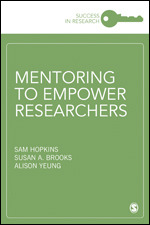Mentoring to Empower Researchers
- Sam Hopkins - University of Surrey
- Susan A. Brooks - Director of Researcher Development, Oxford Brookes University
- Alison Yeung - Dr Alison Yeung, Independent Writing Consultant, Purely Academic Ltd.
Success in Research
Research Methods & Evaluation (General) | Study Skills (Academic) | Study Skills (PG)
• Mentorship for transition points,
• Skills development needed for publication, funding application and networking,
• Mentorship for performing supervision duties.
This is a practical and easy-to-use guide that draws on the editors’ extensive experience, and an invaluable tool for practitioners, career advisors and academics working in research and skills development.
This is a genuinely helpful, approachable and timely contribution to the field of mentoring, which is rightly gaining recognition for its benefits to Higher Education in the UK and internationally. The book is oriented towards practical usage by individuals who are looking to develop and hone key aspects of their skills for a variety of professional reasons (at all stages of their academic careers) and also Higher Education Institutions, not least in respect of the provisions that are made for staff (and doctoral researcher) development and training. While the book can usefully and enjoyably be read from cover-to-cover, it also has the added benefit of being structured in a way that lends itself to use as a ready reference tool, when looking for guidance and advice on any one of a broad range of topics associated with mentoring that it addresses. The book covers topics that will intuitively be familiar to readers who are interested in matters relating to mentoring but then extends this into less familiar territory and thereby challenges its readers to think broadly and flexibly about the range and scope of uses to which a mentoring-based approach can be put, such as in the case of Mentoring to Support Cultural Adaptation, and also Reverse Mentoring.
This book is an essential aid for anyone interested in how researchers can be supported too develop through mentoring. It not only tells us, it shows us, how mentoring can be applied as a range of programmes and practices to enable researchers to build their awareness and confidence, and to move towards the career outcomes they choose for themselves. The book is centred on a deep understanding of research learning and research cultures, and offers very practical ways for Researcher Development professionals to leverage and strengthen supportive relationships for early career colleagues.
This is the definitive playbook for researcher mentees, mentors, and those who support their development. If you are considering or embarking on a mentoring relationship in the research environment (and beyond the hallowed halls of the academy), then you will gain considerably from the guidance and advice that this book has to offer.
The authors have succeeded in creating a unique resource that is both comprehensive and concise; it sets out general principles and at the same time documents specific applications. This book provides harmonious advice and practical activities to benefit all parties in any permutation of a mentoring relationship in research.











